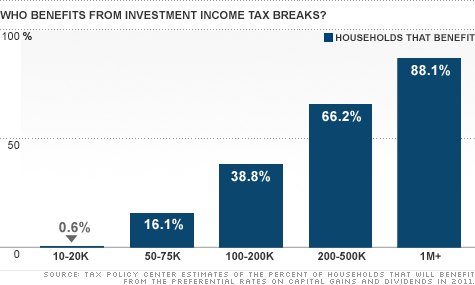Search News

NEW YORK (CNNMoney) -- The tax bills of Mitt Romney and Warren Buffett raise a long-running question: Why do Americans get taxed less on their investment gains than on their paychecks?
In fact, for much of the past century, long-term capital gains have been taxed at lower rates than ordinary income, although often at levels higher than today's 15% rate.
And for much of the past century it's been a contentious issue.
One side says preferential treatment for capital gains is just plain unfair. The tax code, they say, is being used to help the rich get richer, since they make more of their income from capital gains than anyone else.
Their solution: Tax capital gains as regular income.
Then there's the counter argument -- that capital gains, if anything, should be taxed more lightly, or better yet, not at all.
Capital gains are double taxed: One of the principal arguments for taxing capital gains at a lower rate is double taxation.
It goes like this: Stock prices are bolstered by corporate profits, which are subject to corporate tax. Therefore, gains made on stocks have already been taxed.
Tax experts like Len Burman and Martin Sullivan say that double taxation is dumb -- actually, they're more likely to use the term "inefficient."
But they also note the limitations of the double-taxation argument: Some capital gains really are only taxed once.
For instance, some assets that produce capital gains are not subject to a corporate tax. Think real estate, art or a pass-through business.
And some capital gains escape taxation altogether. A beneficiary of an estate does not owe tax on the capital gains accrued on an asset during the lifetime of the person who died.
Many gains are just inflation: One reason to keep capital gains rates lower is inflation. That is, some portion of one's gains can be attributed to inflation between the purchase and sale of an asset. And sometimes it's the whole kahuna.
Tax expert Bruce Bartlett, in a 2001 paper, cited research showing that after accounting for inflation investors booked a real investment loss of $231 billion on nominal gains of $3 trillion between 1946 and 1977.
To help mitigate the inflation hit, lawmakers have typically taxed capital gains at a lower rate than ordinary income or let investors exclude some portion of their gains from taxation.
A lower rate spurs the economy: The most common argument for a lower gains rate is that it spurs investment and risk-taking, which can lead to economic growth and higher federal revenue.
Burman doesn't doubt a lower rate might spur investment and risk-taking. But there's no proven correlation with economic growth, he said. "It doesn't prove there's not a relationship. It's just not the silver bullet it's made out to be."
In part that may be because it's hard to quantify risk-taking, Bartlett noted in his new book about tax reform, "The Benefit and the Burden." But he also asserts that that impact of a lower gains rate on growth is "ambiguous."
Policy experts worry that a high capital gains rate can cause investors to hold onto assets longer than they otherwise might, preventing them from using their gains to reinvest in other assets.
Then again, some say a higher rate won't deter investors.
"I have yet to see anyone -- not even when capital gains rates were 39.9% in 1976-77 -- shy away from a sensible investment because of the tax rate on the potential gain," billionaire investor Warren Buffett wrote in a New York Times op-ed.
A lot of arguments made to justify a low capital gains rate are really about "general flaws with the tax system, not a reason to lower the capital gains rate per se," Burman said.
One argument for not singling out capital gains for special relief: They are not the only kind of capital income that can be double taxed or hurt by inflation. So are dividends.
And creating special tax breaks for capital gains gives people a reason to seek out tax shelters.
One proposed solution is to tax capital gains and dividends as ordinary income but significantly lower ordinary income tax rates.
That was the recommendation of President Obama's bipartisan debt commission and the Bipartisan Policy Center's Debt Reduction Task Force. And it's what President Reagan and Congress did when they reformed the tax code in 1986.
"If you tax capital gains as ordinary income it raises a lot of revenue to cut other rates," said Burman, who worked on the 1986 reform and was a member of the Bipartisan Policy Center task force.
"It maintains high progressivity while lowering rates and it closes down the biggest opportunity for tax shelters." ![]()
| Overnight Avg Rate | Latest | Change | Last Week |
|---|---|---|---|
| 30 yr fixed | 3.80% | 3.88% | |
| 15 yr fixed | 3.20% | 3.23% | |
| 5/1 ARM | 3.84% | 3.88% | |
| 30 yr refi | 3.82% | 3.93% | |
| 15 yr refi | 3.20% | 3.23% |
Today's featured rates:
| Latest Report | Next Update |
|---|---|
| Home prices | Aug 28 |
| Consumer confidence | Aug 28 |
| GDP | Aug 29 |
| Manufacturing (ISM) | Sept 4 |
| Jobs | Sept 7 |
| Inflation (CPI) | Sept 14 |
| Retail sales | Sept 14 |